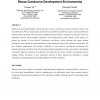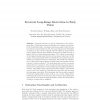1807 search results - page 310 / 362 » Cognitive Models of the Brain |
ATAL
2010
Springer
13 years 11 months ago
2010
Springer
Speakers in dialogue tend to adapt to each other by starting to use similar lexical items, syntactic structures, or gestures. This behaviour, called alignment, may serve important...
ASE
2005
13 years 9 months ago
2005
Despite its well-recognized benefits, software reuse has not met its expected success due to technical, cognitive, and social difficulties. We have systematically analyzed the reu...
CE
2005
13 years 9 months ago
2005
Laboratory exercises, field observations and field trips are a fundamental part of many earth science and environmental science courses. Field observations and field trips can be ...
NEUROSCIENCE
2001
Springer
14 years 2 months ago
2001
Springer
Abstract. A general principle of cortical architecture is the bidirectional flow of information along feedforward and feedback connections. In the feedforward path, converging con...
ICIP
2003
IEEE
14 years 11 months ago
2003
IEEE
Current computational models of visual attention focus on bottom-up information and ignore scene context. However, studies in visual cognition show that humans use context to faci...




